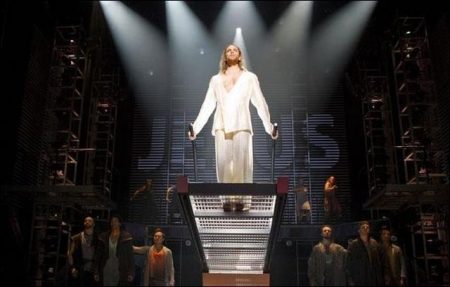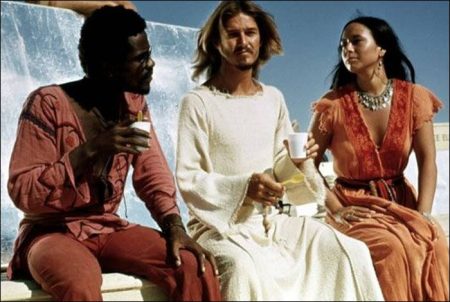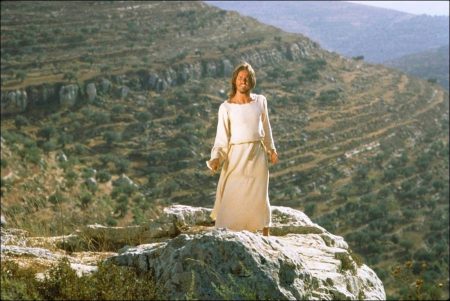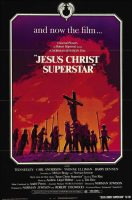Taglines: And now, the movie……
Norman Jewison’s Jesus Christ Superstar is a bright and sometimes breathtaking retelling of the rock opera of the same name. It is, indeed, a triumph over that work; using most of the same words and music, it succeeds in being light instead of turgid, outward-looking instead of narcissistic. Jewison, a director of large talent, has taken a piece of commercial shlock and turned it into a Biblical movie with dignity.
That isn’t easy to do. The life of Christ would seem to have an innate dignity to it, but only in such rare films as Pier Paolo Pasolini’s “The Gospel According to St. Matthew” or Martin Scorsese’s “The Last Temptation of Christ” has Christ come off as human, strong and reachable. The character has a tendency to disintegrate before our eyes; it’s the only male role we can imagine where the cinematographer considers gauze over the lens. Christ seems wispy and too ethereal, and Mary Magdalene begins to steal scenes. The lowest point in this sort of thing was reached by Jeffrey Hunter as Christ in the remake of “King of Kings”–but let that memory steal quietly away.
Jesus Christ Superstar is a 1973 American musical drama film directed by Norman Jewison and co-written by Jewison and Melvyn Bragg based on the Andrew Lloyd Webber/Tim Rice 1970 rock opera of the same name. The film, featuring a cast of Ted Neeley, Carl Anderson, Yvonne Elliman, Barry Dennen, Bob Bingham, and Kurt Yaghjian, centers on the conflict between Judas and Jesus[5] during the week before the crucifixion of Jesus.
Neeley, Anderson and Elliman were nominated for Golden Globe Awards in 1974 for their portrayals of Jesus, Judas, and Mary Magdalene, respectively. Although it attracted criticism from some religious groups, reviews for the film were positive.
About the Story
The film is framed as a group of performers who travel to the desert to re-enact the Passion of Christ. The film begins with them arriving on a bus, assembling their props and getting into costume. One of the group is surrounded by the others, puts on a white robe and emerges as Jesus (“Overture”).
This story, as told by the performance group, begins with Judas, who is worried about Jesus’ popularity; he is being hailed as the Son of God, but Judas feels he is just a man who is beginning to believe his own message and fears the consequences of their growing movement (“Heaven on Their Minds”). The other disciples badger Jesus for information about his plans for the future, but Jesus will not give them any (“What’s the Buzz?”).
Judas’ arrival and subsequent declaration that Jesus should not associate with Mary Magdalene dampens the mood (“Strange Thing Mystifying”). Angrily, Jesus tells Judas that he should leave Mary alone, because his slate is not clean. He then accuses all the apostles of not caring about him. That night at the Temple, Caiaphas is worried that the people will crown Jesus as king, which the Romans will take for an uprising.
Annas tries to allay his fears, but he finally sees Caiaphas’ point and suggests that he convene the council and explain his fears to them; Caiaphas agrees (“Then We Are Decided”). As Jesus and his apostles settle for the night, Mary soothes him with some expensive ointment, but Judas says that the money spent should have been given to the poor. Jesus rebukes him again, telling him that the poor will be there always but Jesus will not (“Everything’s Alright”).
The next day at the Temple of Jerusalem, the council of the priests discuss their fears about Jesus. Caiaphas tells them that there is only one solution: like John the Baptist, Jesus must be executed for the sake of the nation (“This Jesus Must Die”). As Jesus and his followers joyfully arrive in Jerusalem, Caiaphas orders Jesus to disband the crowd for fear of a riot. Jesus refuses and speaks to the crowd instead (“Hosanna”).
Later, the apostle Simon the Zealot and a crowd of followers voice their admiration for Jesus (“Simon Zealotes”). Jesus appreciates this, but becomes worried when Simon suggests directing the crowd towards an uprising against their Roman occupiers. Jesus sadly dismisses this suggestion, saying that they do not understand his true purpose (“Poor Jerusalem”).
Pilate, the Roman governor of Judea, reveals that he has dreamed about a Galilean man (Jesus) and that he will be blamed for this man’s death (“Pilate’s Dream”). Jesus and his followers arrive at the temple, which has been taken over by money changers and prostitutes (“The Temple”). To Judas’ horror and as the priests watch in the background, a furious Jesus destroys the stalls and forces them to leave.
Jesus wanders alone outside the city, but is surrounded by a crowd of lepers, all wanting to be healed. Jesus tries to heal as many of them as possible, but is overwhelmed by the sheer numbers and eventually gives up, screaming at them to leave him alone. Mary comforts Jesus and Jesus goes to sleep (“Everything’s Alright [Reprise]”).
Mary loves Jesus, but is confused because he is so unlike any other man she has met (“I Don’t Know How to Love Him”). Judas goes to the priests and expresses his concerns, but he is worried about the consequences of betraying Jesus (“Damned for All Time”). The priests take advantage of his doubts and offer him money if he will lead them to Jesus. Judas initially refuses, but Caiaphas and Annas win him over by reminding him that he could use the money to help the poor. Judas reveals that Jesus will be at the Garden of Gethsemane on Thursday night (“Blood Money”).
Jesus Christ Superstar (1973)
Directed by: Norman Jewison
Starring: Ted Neeley, Carl Anderson, Yvonne Elliman, Barry Dennen, Larry Marshall, Josh Mostel, Kurt Yaghjian, Paul Thomas, Robert LuPone, Jonathan Wynne, Richard Molinare
Screenplay by: Melvyn Bragg, Norman Jewison
Production Design by: Richard Macdonald
Cinematography by: Douglas Slocombe
Film Editing by: Antony Gibbs
Costume Design by: Yvonne Blake
Art Direction by: John Clark
Music by: Andrew Lloyd Webber
MPAA Rating: None.
Distributed by: Universal Pictures
Release Date: August 15, 1973
Views: 394











